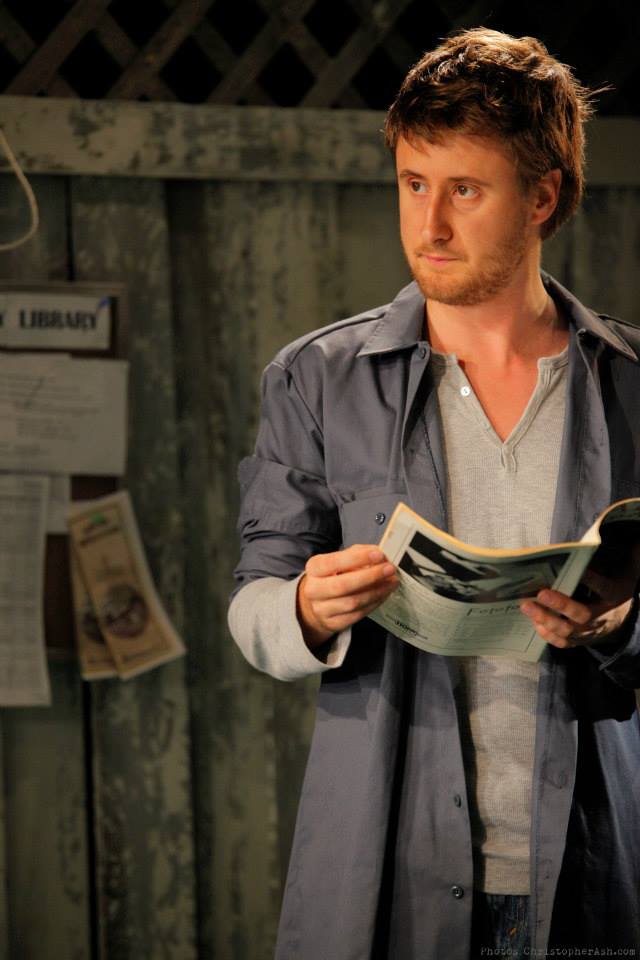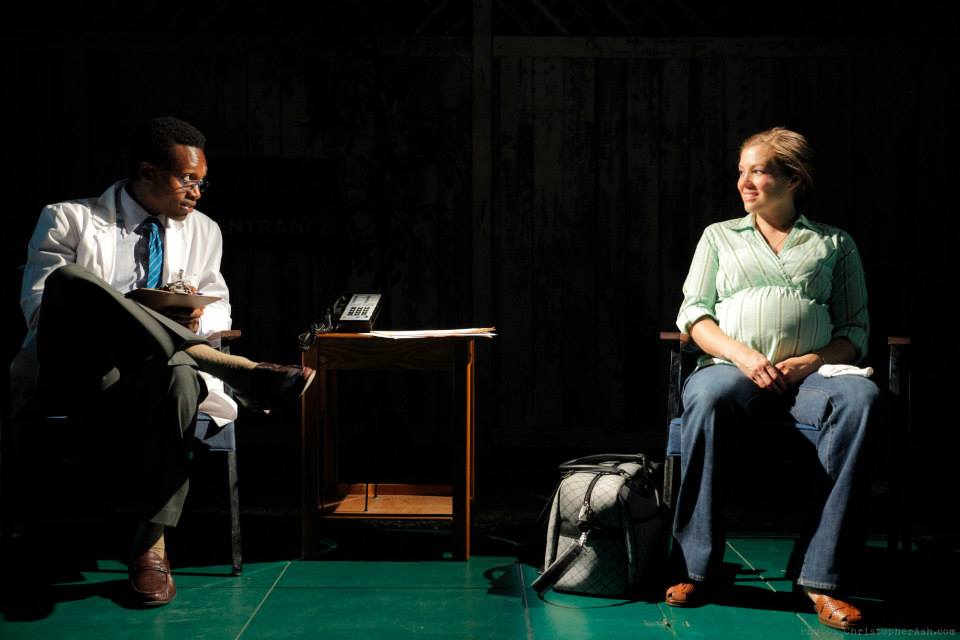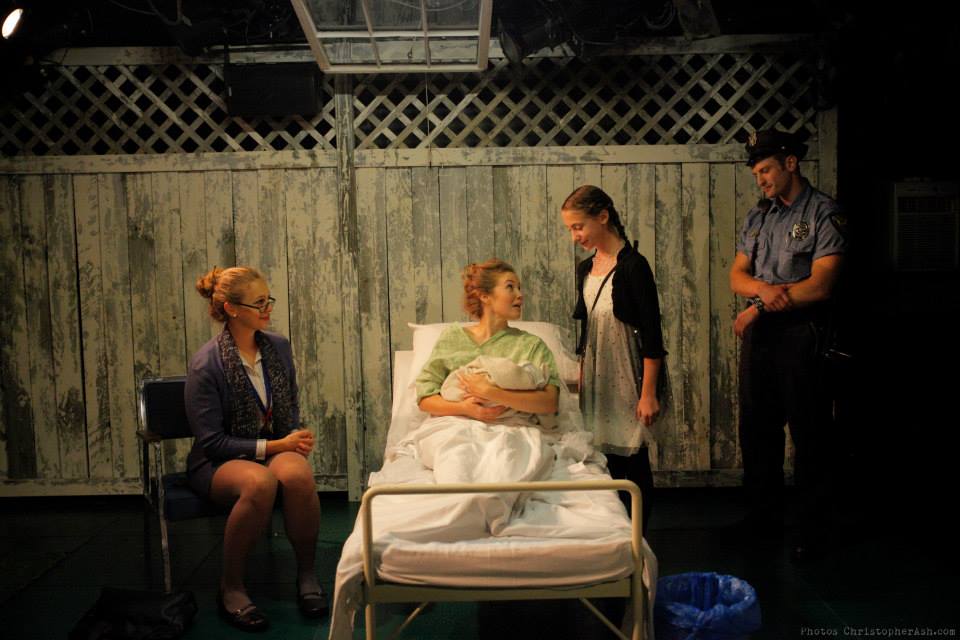Review of Will Eno’s Middletown The Yale Summer Cabaret paid tribute to its 40-year existence last night and the festivities included a performance of Will Eno’s Middletown, directed by 2014 Co-Artistic Director Luke Harlan. It’s a very fitting match as the play opens with a welcoming monologue that extends to “everyone,” and certainly feels right as an address to “fellow Middletonians,” including the board members, supporters, founders, patrons, fans, and other friends of the Summer Cab who showed up for the evening. Ato Blankson-Wood’s delivery of the opening greeting invited comparisons to a stand-up comic working the crowd as his pacing had to accommodate bursts of laughter and delight from the audience. It would be hard to imagine a more apropos setting for the opening speech, or a better speech for the occasion.
Middletown certainly puts the Summer Cab on its mettle. It’s a large, sprawling play with 11 cast members, including a young teen (Livia Sarnelli), an ingenious set—complete with trapdoors—graced by Nick Hussong’s animated projections of drawings that outline backdrops—a stop sign, a tree, a house, and, at one point, a NASA control panel—and musical interludes that cover the numerous set-changes with the brio I associate with unspecified-TV show breaks. Eno’s play is also the most easily likeable of the Summer Cab’s offerings this year, full of hominess, wit, and a deep regard for the uncertainties of the human condition. Though there are laughs, there really aren’t jokes. The humor is of the “laughing at ourselves” variety. And though there’s death and dysfunction and an occasional threat of violence, the dramatic stakes don’t seem too daunting. Or rather say the stakes don’t seem heightened for dramatic effect. The stakes of the play are as high and deep as life itself.
A play you might easily have in mind while watching Middletown is Thornton Wilder’s Our Town. Both plays use the setting of an “Anytown” as the vehicle for meditations about what makes humanity human, and both want us to contemplate the aeons that preceded our modern burgh’s grasp of its niceties and the vastness that surrounds its little plot of ground. The planet itself is just such a “plot” and Eno’s play nicely brings us back again and again to thoughts of this island earth: a monument propped on a village green, a landscaper planting a tree and digging up rocks (with a wink at Hamlet’s gravedigger), a story about a rock a rather dissolute young man found as a child, recalled by the town’s famous son—Greg, an astronaut—as he orbits earth, looking at the rock that is our world.
Eno’s play is very much a verbal construct. Dialogue and speeches lose their point if presented too naturalistically, and so he throws in odd asides and self-reflections, and, for some characters, occasional awareness of the audience, to keep the audience off-guard. Every character that appears before us—a Cop (Matt Raich), a Librarian (Annelise Lawson), a Tour Guide (Shaunette Renée Wilson), Tourists (Julian Elijah Martinez and Jenelle Chu)—may seem obvious and easily grasped, and yet Eno wants us to feel the friction between the role and the person in that role. At one point the landscaper (Martinez) and the Cop, his brother-in-law, trade quips about “person” as a temporary job. The deep “need” (as the male tourist expresses it) is to find things about life on earth that can please, amuse or inspire us, distracting us from the presence of death that is everywhere around us, much as outer space surrounds our globe.
The spaciness of certain elements of the show are grounded by what seems to be the budding romance—or maybe just strong personal attachment—between newly arrived neglected wife and soon-to-be-mother Mary (Maura Hooper) and vaguely employed handyman and hobbyist John (Aaron Bartz). Played with forthright charm, their meetings are cute and coy with a kind of anxious agreeableness, commiserating on “dark nights” and sleeping troubles and, generally, trying to figure out what living together in the same place at the same time actually means. Thus the play’s many gestures at how we all occupy similar places keep us implicated, as well as letting us consider how “sense of place” is communicated by what is simply “understood” by inhabitants.
Central to Eno’s vision is the character of Mechanic (Aubbie Merrylees, tremulous and troubled) who provides, in his disaffected and direct asides and uneasy friction with the status quo, the soul of the play. Suspected of everything from bashing a mailbox to writing a dirty word on a sign, Mechanic is the loose cannon, remembered by the Librarian for an odd essay he wrote as a child, and currently appearing in costumes to entertain kids at the hospital as part of a plea deal for an unnamed offense. The play opens with the Cop giving him a hard time for sitting on a bench and a demand that he feel “awe” while being strangled with a billy club. Mechanic becomes something of a Greek chorus or audience surrogate—crouching outside windows, eavesdropping, giving us time to think of some reasons he started drinking again—and, after a sudden death scene, his dance and chant while dressed in a Native American costume epitomizes the play’s sense of how the inauthentic can become authentic (enough) when we need it.
In general, the cast works hard at the timing and pitch of Eno’s carefully calibrated dialogue, which shines at its highest gloss in the exchange between Ato Blankson-Wood’s doctor and Maura Hooper’s musing, bemused, and very pregnant Mary. The doctor’s well-meant string of palliatives about how to behave toward an infant are filled with Eno’s sense both of human precariousness and our (so far) successful instinct for survival. Likewise the scene amongst audience members just before the intermission (which knowingly trumps the chitchat at Cab tables) points toward another of Eno’s great themes: how language communicates and miscommunicates simultaneously, so that, as Mary says, we’re all “just making different sounds with [our] mouth[s].”
Playful and profound, Eno’s Middletown throws its arms around the world in a loving embrace while also retaining a sense of the prickly absurdities and inconveniences that rankle our togetherness in our placid orbit. Luke Harlan’s ambitious production, mounted under the constraints of the Summer Cab’s relentless schedule, highlights the tight weave of the social fabric and the warmth of breathing bodies. This is theater that's as alive as you are.
Middletown has three more showings: tonight and tomorrow night at 8, and Sunday night at 7.
Middletown By Will Eno Directed by Luke Harlan
Scenic Designer: Christopher Thompson; Costume Designer: Steven M. Rotramel; Lighting Designer: Andrew F. Griffin; Sound Designer: Kate Marvin; Projection Designer: Nick Hussong; Stage Manager: Avery Trunko
Cast: Aaron Bartz, Ato Blankson-Wood, Jenelle Chu, Maura Hooper, Annelise Lawson, Julian Elijah Martinez, Aubie Merrylees, Matt Raich, Stephanie Rolland, Livia Sarnelli, Shaunette Renée Wilson
Photographs by Christopher Ash
Yale Summer Cabaret July 31-August 10, 2014





